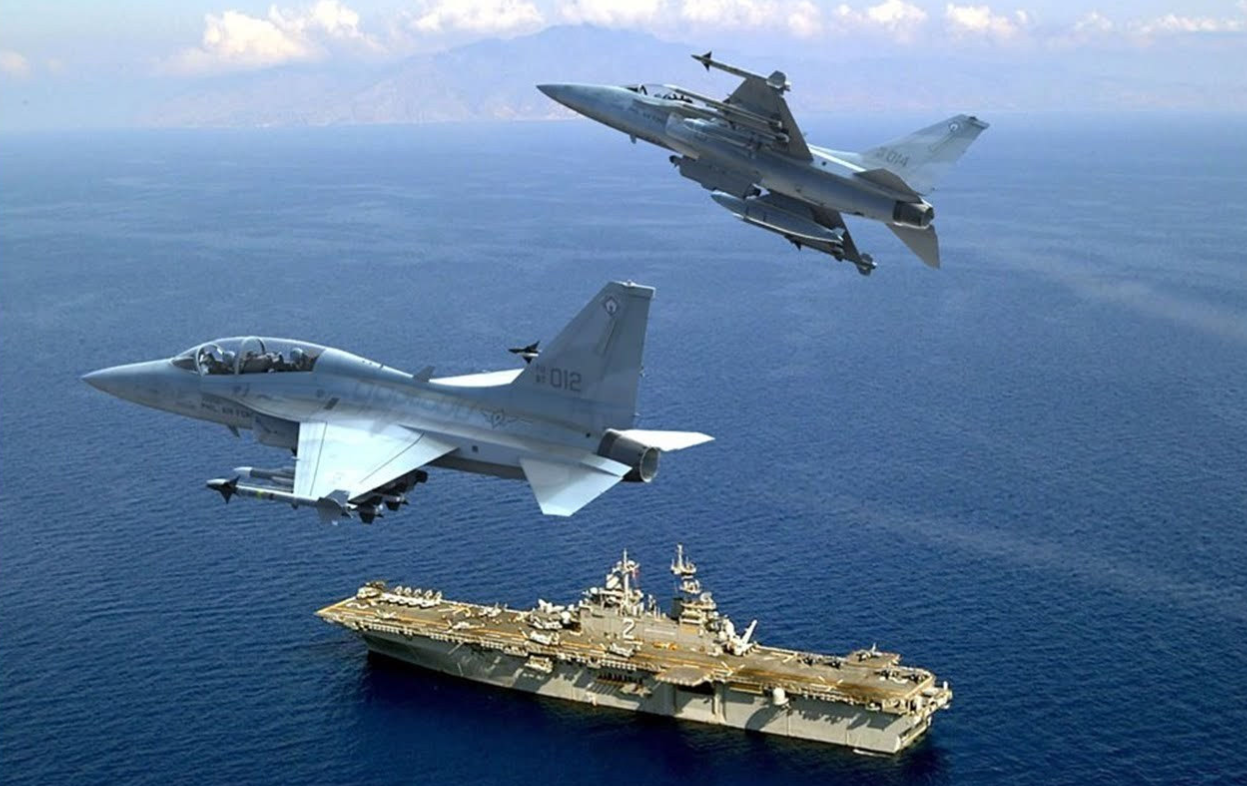
During a US-Philippines joint exercise, the Philippine Air Force fighter jets flow over a US amphibious assault ship.
By Ling Yunzhi
According to reports by Reuters, the Philippine Ambassador to the US Jose Manuel G. Romuldez said recently that the US and the Philippines have been planning a joint patrol in the South China Sea, possibly including Japan and Australia, and the talks on this are currently on the way. If the plan could be implemented as planned, destabilizing factors in the South China Sea are sure to increase, rendering the regional security situation even more complex.
Promoting the in-depth development of the US-Philippines alliance
Since President Rodrigo Duterte government stepped down in June 2022, the US has frequently engaged in contacts with the Marcos government. On September 22, 2022, US President Joe Biden met with new Philippine President Ferdinand Marcos Jr. on the sidelines of the United Nations General Assembly (UNGA), during which Biden expressed the US' willingness to jointly safeguard the so-called freedom of navigation operation in the South China Sea.
On February 2, 2023, US Secretary of Defense Lloyd Austin visited the Philippines. The two sides issued a joint announcement reading that the US military forces will be allowed to build four new bases in the Southeast Asian nation. On February 21, Lloyd Austin called his Philippine counterpart, Carlito Galvez Jr., to reiterate Washington's support and commitment to help defend its oldest treaty ally in Asia and "discussed proposals to deepen operational cooperation and enhance the US and the Philippines' shared security, including the recent decision to resume combined maritime activities in the South China Sea".
Against this context, the Philippines invited the US to participate in a joint patrol in the South China Sea, with the fundamental purpose to repair its alliance with the US through military cooperation, so as to enhance its position in the US Indo-Pacific strategy and alliance network.
The involvement of Australia and Japan will complicate disputes in the South China Sea
With the continuous adjustment of its defense policy, Japan has been committed to developing southward and expanding its influence to Southeast Asian countries in recent years. In addition, Japan has repeatedly expressed its hope to reach a "visiting forces agreement" with the Philippines, so that the Japanese Self-Defense Force can get involved in the national defense of the Philippines to the maximum extent.
In recent years, Australia has carried out multiple military operations alone or jointly in the South China Sea. On February 22, 2023, Australian Minister of Defense Richard Marles expressed at a press conference that the Australian government intended to further deepen bilateral defense relations with the Philippines and that the joint maritime patrol with the Philippine Navy in the South China Sea would be the "next step" to take by the Australian Navy.
These remarks and statements of Japan and Australia chimed in with Philippines’ South China Sea policy intention, which further promoted the Philippines' willingness to conduct joint patrols in the South China Sea. From the perspective of future development, the involvement of Japan and Australia in the South China Sea patrol means that the Philippines is to have more weights in dialogue and negotiation with China on the South China Sea dispute, which will render the dispute even more complicated.
The four-nation alliance of the US, Japan, Australia and the Philippines hard to form
Since the Philippines, Japan and Australia are all allies of the US, there is some maneuverability among them in taking joint military operations, and they may even have mechanisms such as the Quad of the US, Australia, India, and Japan, and the trilateral security partnership AUKUS of the US, the UK and Australia. But in reality, it is unlikely to achieve such an alliance in the foreseeable future.
First of all, the US, as the core of the alliance, has taken an ambiguous posture towards the sovereignty of the South China Sea for a long time due to its own political needs. Therefore, there is still doubt about the sincerity of the US in its cooperation with the Philippines. The US’ attitude will also directly affect the will and motivation of Japan and Australia.
In addition, the joint patrol of the US, Philippines, Japan and Australia in the South China Sea is bound to destroy the current situation of the South China Sea issue and leads to the escalation of the dispute, which is not what the surrounding countries want to see. Many Southeast Asian countries are unwilling to take sides between China and the US, and do not want foreign powers to show off their armed strength or stir up the situation in the South China Sea.
Furthermore, although the Philippines hopes to deepen its military cooperation with the US, it does not mean that it is willing to serve as a pawn in the confrontation between the US and China. Philippine President Marcos said on many occasions that the Philippines needs to cooperate with China economically and confrontation with China is not in the fundamental interests of the Philippines.
Therefore, the Philippine plan to carry out a joint patrol with the US, Japan and Australia in the South China Sea is more of a momentum under the constraints of various factors, and the symbolic significance is greater than the practical one. It is even more difficult to realize the so-called "alliance of the US, Philippines, Japan and Australia", which is highly sensitive to the South China Sea issue.
Editor's note: Originally published on thepaper.cn, this article is translated from Chinese into English and edited by the China Military Online. The information and opinions in this article do not necessarily reflect the views of eng.chinamil.com.cn.













